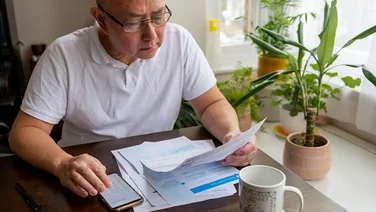We receive a small fee from trusted installers when you request a quote through our site. This helps us keep our content independent, well-researched and up to date – Learn more
- How much does electricity cost per kWh?
- UK consumer electricity prices kWh: Single-rate and multi-rate
- How is energy cost determined in the UK?
- What is typical domestic consumption?
- What energy bill support is available?
- What can I do to reduce my energy costs?
- Electricity costs for different ways to pay
- How much have electricity prices increased over the past decade?
- Summary
- Electricity usage is measured in kilowatt-hours (kWh)
- Electricity will cost 27.69p per kWh from January
- The Energy Price Cap determines the maximum cost of domestic energy
- Solar panels will reduce your energy bills by 70% on average (according to the Energy Saving Trust)

As of 1 January 2026, electricity will cost 27.69p per kWh and gas 5.93p per kWh. Households will also pay a daily standing charge of 54.75p for electricity and 35.09p for gas. These rates are set under Ofgem’s latest Energy Price Cap, which changes every three months.
Compared to previous rates, this means the average household will save around £3 more per month.
In this guide, we’ll explain how electricity and gas prices are set, what the standing charge means, and how the price cap affects your bills, plus whether renewable energy might help you cut costs further.
How much does electricity cost per kWh?
According to Ofgem’s most recent announcement, the price of electricity will increase from 1 January to 31 March 2026 to 27.69p per kWh, an increase from 26.35p.
Below is the average price for energy if you pay by Direct Debit over the last three quarters. However, this price may vary slightly depending on your payment method and location.
| Energy source | 1 July to 30 September 2025 | 1 October to 31 December 2025 | 1 January to 31 March 2026 |
|---|---|---|---|
Electricity | 25.73p per kWh | 26.35p per kWh | 27.69p per kWh |
Gas | 6.33p per kWh | 6.29p per kWh | 5.93p per kWh |
*Data courtesy of Ofgem
UK consumer electricity prices kWh: Single-rate and multi-rate
The average cost of electricity varies by region and changes every three months once Ofgem announces a new price cap.
Electricity standing charges and unit rates paid by Direct Debit, single rate
From 1 January 2026, the regional price cap for those who pay by Direct Debit and a single rate:
| Region | Daily standing charge October to December 2025 | Daily standing charge January to March 2026 | Unit rate October to December 2025 | Unit rate January to March 2026 |
|---|---|---|---|---|
| North West | 56.16p per day | 52.22p per day | 27.11p per kWh | 28.45p per kWh |
| Northern | 59.86p per day | 60.93p per day | 25.43p per kWh | 26.75p per kWh |
| Yorkshire | 58.65p per day | 59.72p per day | 25.33p per kWh | 26.69p per kWh |
| Northern Scotland | 61p per day | 62.07p per day | 27.06p per kWh | 28.36p per kWh |
| Southern | 44.62p per day | 45.70p per day | 26.48p per kWh | 27.83p per kWh |
| Southern Scotland | 56.55p per day | 57.62p per day | 25.84p per kWh | 27.18p per kWh |
| North Wales and Mersey | 69.95p per day | 71.01p per day | 27.72p per kWh | 29.09p per kWh |
| London | 46.06p per day | 47.11p per day | 25.63p per kWh | 27p per kWh |
| South East | 47.60p per day | 48.66p per day | 26.92p per kWh | 28.27p per kWh |
| Eastern | 48.25p per day | 49.33p per day | 26.53p per kWh | 27.88p per kWh |
| East Midlands | 49.09p per day | 50.17p per day | 25.55p per kWh | 26.89p per kWh |
| Midlands | 53p per day | 54.08p per day | 25.64p per kWh | 26.99p per kWh |
| Southern Western | 54.03p per day | 55.11p per day | 26.82p per kWh | 28.16p per kWh |
| South Wales | 51.69p per day | 52.75p per day | 26.83p per kWh | 28.18p per kWh |
| Great Britain average | 53.68p per day | 54.75p per day | 26.35p per kWh | 27.69p per kWh |
*Data courtesy of Ofgem
Electricity standing charges and unit rates paid by Direct debit, multi-rate
If you pay different prices for the used electricity at different times of day, also known as a multi-rate and includes Economy 7 meters, this is what you’ll pay under the cap if you pay by Direct Debit:
| Region | Daily standing charge October to December 2025 | Daily standing charge January to March 2026 | Unit rate October to December 2025 | Unit rate January to March 2026 |
|---|---|---|---|---|
| North West | 50.56p per day | 51.49p per day | 25.77p per kWh | 26.98p per kWh |
| Northern | 59.17p per day | 60.14p per day | 24.40p per kWh | 25.60p per kWh |
| Yorkshire | 58.12p per day | 59.05p per day | 24.38p per kWh | 25.61p per kWh |
| Northern Scotland | 61.95p per day | 62.89p per day | 25.83p per kWh | 27.01p per kWh |
| Southern | 44.78p per day | 45.73p per day | 25.34p per kWh | 26.56p per kWh |
| Southern Scotland | 57.55p per day | 58.40p per day | 24.73p per kWh | 25.95p per kWh |
| North Wales and Mersey | 69.30p per day | 70.21p per day | 26.41p per kWh | 27.64p per kWh |
| London | 45.74p per day | 46.63p per day | 24.59p per kWh | 25.83p per kWh |
| South East | 48.04p per day | 49.04p per day | 25.68p per kWh | 26.89p per kWh |
| Eastern | 48.66p per day | 49.65p per day | 25.37p per kWh | 26.60p per kWh |
| East Midlands | 48.59p per day | 48.57p per day | 24.51p per kWh | 25.72p per kWh |
| Midlands | 52.77p per day | 53.67p per day | 24.62p per kWh | 25.82p per kWh |
| Southern Western | 54.66p per day | 55.69p per day | 25.59p per kWh | 26.79p per kWh |
| South Wales | 50.76p per day | 51.74p per day | 25.64p per kWh | 26.86p per kWh |
| Great Britain average | 53.62p per day | 54.56p per day | 25.20p per kWh | 26.42p per kWh |
*Data courtesy of Ofgem

Get £7500 towards your heat pump installation through a trusted installer
An MCS-certified heat pump installer can apply for the Boiler Upgrade Scheme on your behalf, get a quote from one now
How is energy cost determined in the UK?
The energy price cap largely determines the cost of domestic energy in the UK.
The UK’s energy price cap and Energy Price Guarantee set a maximum price that energy suppliers can charge the average consumer for each kWh of energy they use. These ensure that prices for customers on default energy tariffs are fair.
The price cap is set by Ofgem, the government’s energy regulator, and it changes every three months.
It’s calculated using Typical Domestic Consumption Values (TDCVs) which give consumers an idea of the average energy use of different households.
The Spark Gap is the name given to the difference between the price of electricity and gas. It’s often pinpointed as one of the main hurdles in the rollout of clean technology, especially heat pumps. For more information on the Spark Gap, read our dedicated page.
Even though the price cap is given as a set number, that number represents what the average household will pay.
It’s not a set upper limit, and some people will pay less and some more, based on how much electricity they use – those who use less than the average household will pay less than the cap, and those who use more will pay more.
The price cap also varies slightly by region, so the figures Ofgem releases at the start of each new price cap period are just averages.
A kilowatt-hour, kWh for short, is used to measure the amount of energy someone is using. You’ll most likely have seen it on your energy bills, as electricity providers charge customers based on how much electricity they use per kWh.
For example, one kWh of electricity is enough to power a 100-watt lightbulb for 10 hours.
Some might get kW and kWh mixed up, but they are different. A kW measures how much power an electric appliance consumes, while a kWh measures the energy an appliance has consumed over a period of time.
You can liken the two to looking at the speed of your car for a single moment (let’s say you’re doing 30 mph) and the total distance you’ve traveled over, say, an hour. The former (kW) is like your current speed, and the latter (kWh) is the total distance (total consumption) you’ve covered.
What is typical domestic consumption?
Ofgem determines how much energy the typical household uses by looking at historical averages.
They consider different types of meters and high and low energy use to come up with the current average. Your actual consumption might be higher or lower than the estimates Ofgem gives.
Ofgem’s average values are then used to estimate the annual amount charged to a typical household that pays by Direct Debit and is on a standard variable tariff.
Energy use | Home size and number of occupants | Average annual electricity use |
|---|---|---|
Low | Flat/1-bedroom house with 1 to 2 occupants | 7,500 kWh |
Medium | 2-3-bedroom house with 2 to 3 occupants | 11,500 kWh |
High | 4+ bedroom house with 4 to 5 occupants | 17,000 kWh |
Courtesy of Ofgem.
What energy bill support is available?
There are various government-backed schemes available to help some UK customers manage their energy bills, including:
- Warm Home Discount: some low-income households or those on the Guarantee Credit element of Pension Credit can get £150 off their energy bills for winter 2025/2026, paid out as a credit between October and March
- Winter Fuel Payment: people born on or before 23 September 1958 can get between £200 and £300 to help pay their energy bills
- Cold Weather Payment: £25 for each seven days of very cold weather (zero degrees Celsius or below) between 1 November 2025 and 31 March 2026. Available for people on certain benefits
- Child Winter Heating Payment: available to help families in Scotland with severely disabled children with heating costs. The payment for winter 2025-2026 is £255.80
We often get asked about government grants for solar panels. For more information on what is available, read our dedicated guide.
Ofgem also requires energy suppliers to provide customers with a payment plan they can afford if they’re unable to pay their bills. All you have to do is contact them.
If you still can’t agree with your supplier, you can contact Citizens Advice or Advice Direct Scotland if you live in Scotland.
What can I do to reduce my energy costs?
There are also small changes you can make straight away to reduce your monthly bills. These include:
- Low-energy LED lighting: The average household has around 34 light bulbs, each using energy, and will spend about £77 on lighting each year. LED lighting uses 75% less energy than halogen lightbulbs, reducing the demand for electricity
- Check your appliances: When buying new appliances, choose energy-efficient appliances. According to the Energy Saving Trust, cooking, cooling or freezing and wet appliances (such as washing machines, dish washers, etc.) account for 13% of an average household’s energy consumption
- Switch to solar energy: Solar energy can save you between hundreds and thousands of pounds per year on your energy bills while reducing your carbon emissions.
- Turning plugs off: Walk around your home (or office) and unplug anything that isn’t in use. This will ensure you’re not using excess electricity you don’t need to.
- Install a smart meter: A smart meter will help you understand your electricity usage, allowing you to monitor your daily usage and react accordingly to reduce it.
A standing charge is a fixed daily fee that appears on your energy bills each month. These charges are applied to cover the costs of things like maintaining the energy supply network, meter readings, and other services.
Standing charges apply irrespective of how much energy you use, and are even applied if a building is empty and not consuming any energy.
Part of these charges include levies raised by the government to pay for initiatives like helping vulnerable households and reducing carbon emissions.
Electricity costs for different ways to pay
The cost of electricity varies based on how you pay and what type of tariff you are on. There are four types of tariffs:
- Standard variable tariff, or ‘default tariff,’ means the price of energy changes every time the price cap changes, usually every three months. You can also pay on receipt of a bill in the mail, which comes every three months
- A prepayment meter is a pay-as-you-go, where you top up your meter using a prepayment card purchased at various locations or online.
- People with fixed-rate tariffs will continue to pay the electricity cost they’ve agreed to pay until the end of their contract.
- Economy 7, or multi-rate, is an electricity tariff offering cheaper rates for off-peak hours and more expensive rates during peak hours.
Everyone must also pay a standing charge, which is a fixed daily amount you have to pay for energy, no matter how much you use.
How much have electricity prices increased over the past decade?
Since 2015, the price of electricity has increased by 54.6%, driven up sharply by the pandemic and the war in Ukraine, both of which have put huge pressures on international energy markets.
As the percentage of the UK’s electricity from renewables increases, electricity prices will become more stable.
Geopolitical crises like the war in Ukraine don’t affect electricity from UK renewables, which can make energy prices shoot up.
However, some renewables, such as solar and wind, are weather-dependent, so electricity prices could increase or decrease in the future depending on the weather. That’s why having electricity from a mix of different renewables is important.
Fast forward to the beginning of this year, Ofgem, between 1 January and 31 March 2025, set the energy price cap at £1,738 per year for a typical household.
As for a year later, between 1 January and 31 March 2026, Ofgem has confirmed the energy price cap will increase by 0.2% to £1,758 per year. You can check Ofgem’s handy guide to find out more about average gas and electricity usage.
To better understand how much electricity prices have increased over the past decades, check out the graph below.
Summary
- Ofgem determines how much energy is used by the typical household by looking at historical averages
- A kWh is used to measure the amount of energy someone is using
- Ofgem also requires energy suppliers to provide customers with a payment plan they can afford if they’re unable to pay their bills.
- If you still can’t agree with your supplier, you can contact Citizens Advice or Advice Direct Scotland if you live in Scotland
- The cost of electricity varies based on how you pay and what type of tariff you are on









